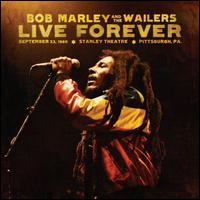Home » Jazz Musicians » Bob Marley
Bob Marley
Robert Nesta Marley was a Jamaican singer, songwriter, and musician. Considered one of the pioneers of reggae, his musical career was marked by fusing elements of reggae, ska, and rocksteady, as well as his distinctive vocal and songwriting style. Marley's contributions to music increased the visibility of Jamaican music worldwide, and made him a global figure in popular culture for over a decade. Over the course of his career, Marley became known as a Rastafari icon, and he infused his music with a sense of spirituality.[6] He is also considered a global symbol of Jamaican music and culture and identity, and was controversial in his outspoken support for democratic social reforms. In 1976, Marley survived an assassination attempt in his home, which was thought to be politically motivated. He also supported legalization of marijuana, and advocated for Pan-Africanism.
Born in Nine Mile, British Jamaica, Marley began his professional musical career in 1963, after forming Bob Marley and the Wailers. The group released its debut studio album The Wailing Wailers in 1965, which contained the single "One Love/People Get Ready"; the song was popular worldwide, and established the group as a rising figure in reggae. The Wailers subsequently released eleven further studio albums; while initially employing louder instrumentation and singing, the group began engaging in rhythmic-based song construction in the late 1960s and early 1970s, which coincided with the singer's conversion to Rastafari. During this period Marley relocated to London, and the group embodied their musical shift with the release of the album The Best of The Wailers (1971).
The group attained international success after the release of the albums Catch a Fire and Burnin' (both 1973), and forged a reputation as touring artists. Following the disbandment of the Wailers a year later, Marley went on to release his solo material under the band's name. His debut studio album Natty Dread (1974) received positive reception, as did its follow-up Rastaman Vibration (1976). A few months after the album's release Marley survived an assassination attempt at his home in Jamaica, which prompted him to permanently relocate to London. During his time in London he recorded the album Exodus (1977); it incorporated elements of blues, soul, and British rock and enjoyed widespread commercial and critical success.
In 1977, Marley was diagnosed with acral lentiginous melanoma on his toenail, and died on May 11, 1981. His fans around the world expressed their grief, and he received a state funeral in Jamaica.
Read moreTags
Marley: Collector's Edition (2DVD)

by Doug Collette
Bob Marley Marley: 2 DVD Collector's Edition Tuff Gong Worldwide 2025 There have been other works devoted to Bob Marley ostensibly as comprehensive as Academy Award-winning filmmaker Kevin Macdonald's picturesque historical film Marley. But the addition of this absorbing piece to a list including, but hardly limited to, Timothy White's print biography Catch A Fire (Elm Tree Books, 1983) and the 2024 biopic Bob Marley: One Love (Paramount Pictures, 2024), only clarifies the depth and ...
Continue ReadingCatch A Fire: 50th Anniversary Edition (3 CD)

by Doug Collette
Bob Marley and the Wailers' Catch A Fire 50th Anniversary Edition is a logical extension of the 2001 Deluxe Edition of the title. Whereas that latter double-CD package included this seminal reggae record in both its original and overdubbed form, this latest exhumation from the vault includes the studio album as originally released, the complete concert of the band 'Live at the Paris Theatre in London' (previously only ever bootlegged) and a third compact disc of alternate, extended and instrumental ...
Continue ReadingBob Marley and the Wailers: The Capitol Session '73

by Doug Collette
Bob Marley and the Wailers The Capitol Session '73 Mercury Studios 2021 Talk about buried treasure indeed! Bob Marley and The Wailers The Capitol Session '73 would not exist in this CD/DVD package (or it's other configurations) if not for a series of deceptively fortuitous events that occurred nearly a half-century ago. As described by author John Masouri in his comprehensive liner notes, it all sounds implausible--especially considering some of the names involved--except that it's ...
Continue ReadingKaya 40

by Nenad Georgievski
In recent years there hasn't been a shortage of reissues of various artists as every five years there is some sort of anniversary which is a plausible reason for issuing an avalanche of remastered editions with various bonus materials in different formats. And it's amazing that music from past decades and long gone eras still manages to remind people of its timeless qualities. One of those artists whose music and shadow loom larger with the years is singer and reggae ...
Continue ReadingBob Marley: Uprising Live!

by Doug Collette
Bob Marley Uprising Live! Eagle Vision 2014 Given Bob Marley's status as a cultural icon, it only makes sense that it's impossible not to engage in the truisms of 'what if' and/or 'if only' watching Uprising Live! By the time of his untimely death from cancer in May of 1981, the Jamaican musician had achieved almost as much politically as artistically in his relatively short career span. Marley was already ill and under ...
Continue ReadingBob Marley & The Wailers: Kaya Deluxe Edition

by Doug Collette
It's telling that the photos of Bob Marley adorning the first half of the comprehensive booklet with this 'Deluxe Edition' of Kaya show the late third-world icon beaming and smiling right and left, much as he does on the front cover. In contrast, the photos interspersed with song lyrics and recording detail in the latter half of the insert display an intense man unafraid to address serious issues, the likes of which he mainly avoided, and was thus criticized for, ...
Continue ReadingBob Marley and The Wailers: Live Forever

by Doug Collette
Like Miles Davis and Jimi Hendrix, Bob Marley is one of those rare musical figures who achieved mythic status during his own lifetime. The Jamaican reggae master's legacy has grown posthumously-- due, in large measure, to the astute archiving of his recordings. Live Forever documents his final performance. At the time of this September, 1980 show at Pittsburgh's Stanley Theatre, Marley was less than a year from his death due to cancer, so the invocation of his Rastafarian ...
Continue ReadingBob Marley and the Wailers, Live Forever (2011)

Source:
Something Else!
By Nick DeRiso The aptly titled Live Forever, a newly released concert set by Bob Marley and the Wailers, doesn't sound anything like a man just moments away from the end. Instead, it underscores the indominable spirit of the singer and his song. Marley had collapsed while jogging in New York just two days before, on Sept. 21, 1980, but appeared for this sold-out date at the Stanley Theatre in Pittsburgh, Penn., anyway. Though it would become Marley's last concert ...
read more
Celebrating 66 Years of Jamaica's Reggae King Bob Marley

Source:
JamaicaMusic Offbeat
Bob Marley was the Third World's first pop superstar. He was the man who introduced the world to the mystic power of reggae. He was a true rocker at heart, and as a songwriter, he brought the lyrical force of Bob Dylan, the personal charisma of John Lennon, and the essential vocal stylings of Smokey Robinson into one voice.— says Jann Wenner, at Marley's 1994 posthumous introduction into the Rock and Roll Hall of Fame. In 1999 Time magazine chose ...
read more
"G.R.A.S.S. On Fire" A Jazz-Fueled Take on Seminal Bob Marley Album

Source:
GoMedia PR
Eleven Musicians of the Gowanus Reggae and Ska Society Instrumentally Interpret Music from Catch a Fire With the release of G.R.A.S.S. on Fire, G.R.A.S.S—the appropriately abbreviated Gowanus Reggae and Ska Society—have taken on the challenge of bringing the music of the legendary Bob Marley and the Wailers to an entirely new level. On G.R.A.S.S. on Fire, this collection of eleven intrepid musician/explorers “dedicated to bringing the sounds of classic Ska and Reggae to the fine people of Brooklyn and beyond," ...
read more
Tribute to a Reggae Legend: Global Celebration of Bob Marley, July 13

Source:
Chris M. Slawecki
Tribute to a Reggae Legend: A global celebration of the music of Bob Marley, featuring five new, exclusive recordings by exceptional international artists
Release Date: July 13, 2010 (International release dates vary)
Few people have made the kind of lasting, universal impact that Bob Marley has made with his music. In his short 36 years, Marley managed not only to introduce hundreds of millions to reggae but also spread powerful messages of peace, love, human rights and acceptance. It's no ...
read more
Groundation Announces 10th Annual Bob Marley Tribute Tour

Source:
JamBase
Groundation Announces 10th Annual Bob Marley Tribute Tour
Groundation What compels an internationally successful music group to set out on a tribute tour? Why would a constantly in-demand touring band with a diverse and growing fan base spend what little time they have available playing someone else's music? Well, Groundation is no ordinary band and the music of Robert Nesta Marley is not just any other collection of music.
Groundation began their annual Bob Marley Tribute Tour in ...
read more
'Legend,' Bob Marley's Best-of Album, Lands on a Milestone

Source:
All About Jazz
Bob Marley's Legend has sold more than 10 million copies since 1991, according to Nielsen SoundScan.
Released in 1984, Legend: The Best of Bob Marley and the Wailers didn't stir it up on the charts. It entered Billboard at No. 168 and peaked at No. 54.
But the reggae icon's posthumous collection has lived up to its name by becoming only the 17th album to exceed sales of 10 million copies since Nielsen SoundScan began tabulating in 1991.
It's quite ...
read more
Vincent Ford Songwriter for Bob Marley Dies

Source:
All About Jazz
Some claim Marley gave friend credit to help him support himself. Vincent Ford, a songwriter credited with composing the Bob Marley reggae classic “No Woman, No Cry," has died in Jamaica. He was 68.
Ford died Sunday at a hospital of complications from diabetes, said Paul Kelly, a spokesman for the Kingston-based Bob Marley Foundation.
The song, which appeared on Marley's 1974 Natty Dread album, was inspired by the Kingston ghetto of Trench Town where Marley and Ford ...
read more




















